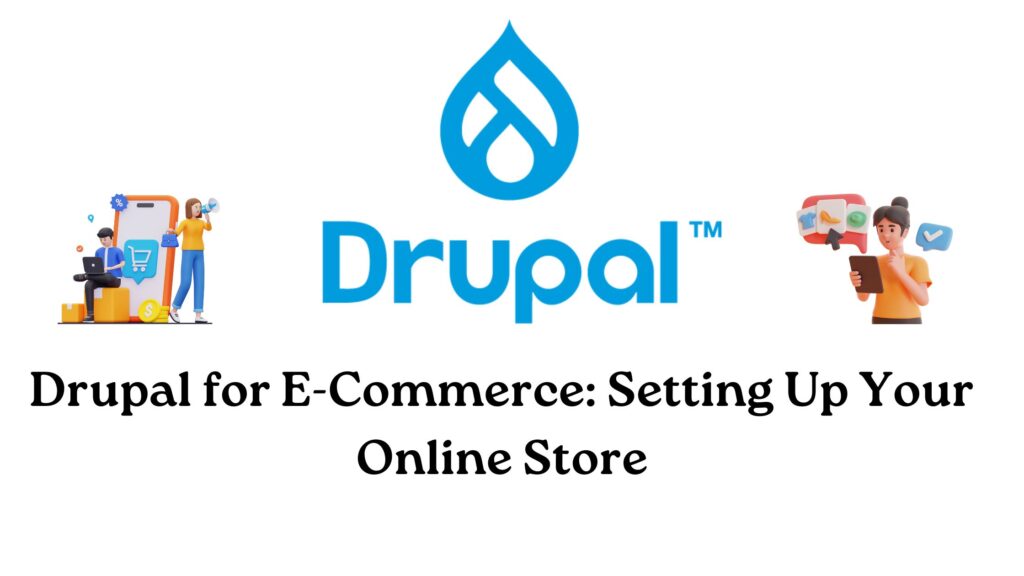Setting up an online store is a significant step for any business looking to expand its reach and increase sales. When it comes to building a robust and scalable e-commerce platform, Drupal offers powerful tools and flexibility that can meet the unique needs of your business. In this article, we’ll explore how Drupal can be leveraged for e-commerce development, providing insights into setting up your online store effectively.

Why Choose Drupal for E-Commerce?
Flexibility and Customization
Drupal is renowned for its flexibility and extensibility, making it an ideal choice for building customized e-commerce solutions. Whether you’re selling physical goods, digital products, or services, Drupal can accommodate various e-commerce requirements. Its modular architecture allows for easy integration of additional features and functionalities, tailored to your business needs.
Scalability
Scalability is crucial for e-commerce websites, especially as your business grows. Drupal’s scalability means it can handle large catalogs, high traffic volumes, and complex transactions without compromising performance. This scalability ensures your online store can grow alongside your business, adapting to changing demands and market trends.
Security
Security is paramount for any e-commerce website handling sensitive customer information and transactions. Drupal has a robust security framework, with regular updates and a dedicated security team that actively monitors and addresses vulnerabilities. This helps protect your online store and instills confidence in your customers.
SEO-Friendly
Drupal is inherently SEO-friendly, providing tools and modules to optimize your online store for search engines. From clean URL structures to customizable meta tags and SEO-focused modules, Drupal helps improve your site’s visibility and rankings in search engine results. This is essential for attracting organic traffic and driving conversions.

Setting Up Your Drupal E-Commerce Store
1. Choose the Right Modules
Drupal offers a range of e-commerce modules that extend its core functionality. Key modules include:
- Drupal Commerce: A flexible and customizable framework specifically designed for e-commerce sites.
- Payment Gateways: Modules like PayPal, Stripe, and Authorize.Net for secure online payments.
- Product Display: Modules for displaying products effectively, managing inventory, and handling orders.
- SEO Modules: Enhance your store’s SEO with modules like Pathauto and Metatag.
Selecting the right modules ensures you have the features necessary to create a seamless shopping experience for your customers.
2. Design and Theme
Select a responsive and user-friendly theme for your Drupal e-commerce site. Themes should prioritize usability, aesthetics, and mobile responsiveness. Drupal’s theme system allows for easy customization to align with your brand identity and provide a cohesive shopping experience.
3. Product Management
Efficient product management is critical for an e-commerce store. Use Drupal’s content types and fields to create detailed product pages with images, descriptions, pricing, and variations. Organize products into categories and tags to facilitate navigation and searchability.
4. Shopping Cart and Checkout Process
Drupal Commerce provides a flexible shopping cart and checkout process that can be tailored to your business requirements. Ensure the checkout process is intuitive, secure, and supports various payment methods. Streamline the checkout flow to minimize cart abandonment and maximize conversions.
5. Security Measures
Implement robust security measures to protect customer data and transactions. Use HTTPS encryption, secure authentication methods, and regularly update Drupal core and modules. Conduct security audits and penetration testing to identify and mitigate vulnerabilities.
6. SEO Optimization
Optimize your Drupal e-commerce site for SEO to attract organic traffic. Use Drupal’s SEO modules to create search engine-friendly URLs, meta tags, and sitemaps. Regularly update content, optimize images, and monitor keyword performance to improve search rankings.
E-Commerce Consulting and Support
For businesses looking to maximize the potential of their Drupal e-commerce store, consider partnering with an e-commerce consulting firm or a Drupal development company. These experts can provide strategic guidance, technical expertise, and ongoing support to optimize your online store’s performance and growth.
Conclusion
Drupal offers a robust platform for building and managing an e-commerce store that is flexible, scalable, secure, and SEO-friendly. By leveraging Drupal’s powerful tools and modules, businesses can create customized and feature-rich online stores that meet their specific needs and objectives. Whether you’re starting from scratch or upgrading an existing platform, Drupal provides the framework to create a successful e-commerce venture. For expert assistance in e-commerce development and maximizing your Drupal e-commerce store’s potential, consider partnering with a reputable Drupal development company. With the right strategy and implementation, your Drupal e-commerce store can drive sales, enhance customer satisfaction, and propel your business growth in the competitive online marketplace.





















































